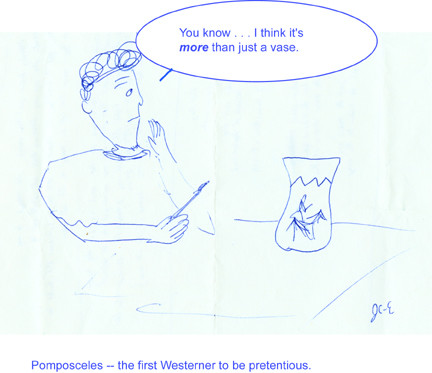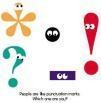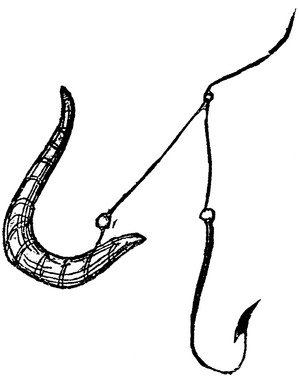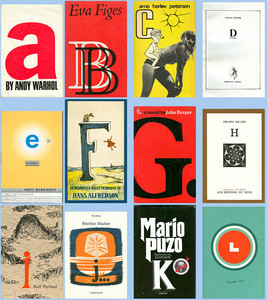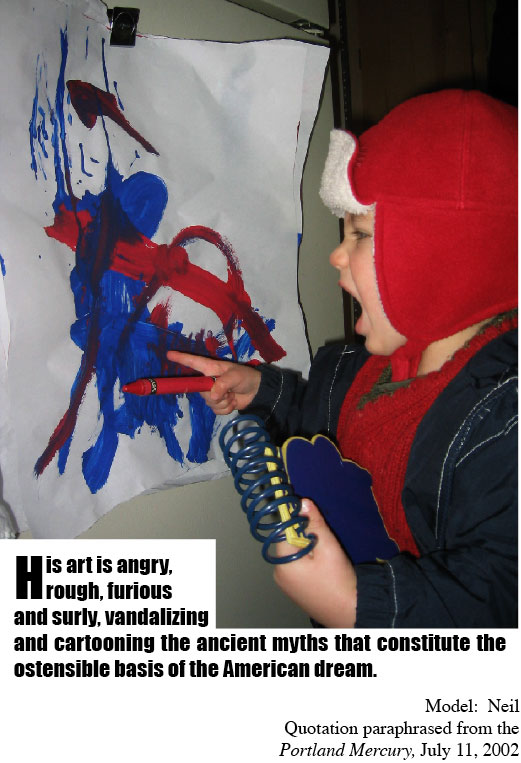|
|
 |
 |
Blame the MessengerIt’s the oldest trick in the world. If it’s bad news, blame the messenger.
—Kenneth Davidson, “Howard’s Telstra Trickery,” The Age (2005)
|

 |
|
|
 |
 |
I particularly love the second paragraph of this ode to the semicolon. It's from the Financial Times (excerpted by Amygdala):
The semicolon “signals that you’re not
expressing a singular thought”, explains the prolific cultural critic,
Chris Lehmann. “It signals that there’s tension, that there is some
contradictory evidence - and you [have to] sort of trust readers to be
able to deal with that, which most editors don’t and many writers
don’t.” Menand locates this fear of complexity in the idea that
language should do no more than hold up a mirror to the world. “If you
subscribe to linguistic transparency, there’s a bias in favour of
simplicity,” he says.
[...]
It may seem bizarre to read so much into a stop on the page, but the
semicolon is a pause for ambiguity, amusement, complexity, doubt, and
nuance. If writing lacks these “genteel” qualities, can we be all that
surprised if it is either as dull as a computer manual, or as demagogic
as a soapbox on Hyde Park Corner? |

 |
|
|
 |
 |
| I Found a Penny Today, So Here's a Thought |
(permalink) |
 |
 |
 |
I saw the documentary "Winged Migration" on DVD, and it got me to
thinking a lot about magic and how breathtaking, uplifting miracles can
become so disappointing (and worse than that -- actually negative, or
an experience of spiritual diminishment) when one discovers the secret
of how the trick works. If you've seen the film, you know what
truly magical moments were caught on camera. Most of the scenes
seem "impossible," so extraordinary are they. I wasn't so much
asking "how did they do it?" (because I knew they must have been in
airplanes and holding cameras!), but more "how could they possibly have
captured so many rare, once-in-a-lifetime occurrences?") It was
one of the most striking movie experiences of my life, and I have seen
a lot of films (well-over three thousand films over the last decade
alone). Alas, I began watching the "making of" featurette on the
DVD, and I was totally devastated. The "secret" of the filmmakers
was far more diabolical than I could have possibly imagined. All
of the magic drained away, and I was left feeling tricked (the bad kind
of tricked -- as in swindled by con-men). When a magician does
something miraculous on stage, you've paid to be entertained and you
delight in being fooled. When a documentary filmmaker dupes you,
it's a whole different story. I found myself feeling outraged
over and over again as I learned about the astonishingly elaborate
methods the filmmakers employed to secure their footage (though they
didn't put strings on the birds' claws and fly them like kites, such a
method wasn't beneath them). I actually had to shut off the DVD
player after the worst revelation -- they crated up the pelicans and
flew them in an airplane to Africa so as to record that leg of the
birds' migratory "journey." I would have far more enjoyed
watching a cartoon about birds, or a LucasArts digital rendering of
birds, because neither would have pretended to be a legitimate
documentary. Of course, it all boils down to packaging, doesn't
it? Had the sham-documentary filmmakers stated upfront that this
film was an artistic depiction of how birds fly, and explained that all
the birds in the film were actors (which is actually quite true, as the
birds had been raised and imprinted by the filmmakers from eggs, then
trained to fly on cue alongside the aircraft and to follow the sound of
the squeeze horn), then I probably would have been quite amazed and
delighted by so elaborate an endeavor! As it was, they presented
a fantastic illusion, then turned around and showed how they did it,
leaving the viewer feeling gullible. Had they been real
wonder-workers instead of con-artists, they would have left the viewer
feeling amazed, not duped.
|

 |
SONG: Dime at a Time
ARTIST: Norma Jean
ORIGINAL LYRIC:
Two dollars in the jukebox...
And I'll put in the jukebox a dime at a time
ADJUSTED FOR INFLATION:
Two dollars in the jukebox...
With each song on the jukebox I'm a quarter shorter
 |
| * Payphones used to take dimes, but now they take quarters. Isn't
it time to update song lyrics to reflect the realities of
inflation? Alas, it's vastly easier to rhyme the word "dime" than
the word "quarter," but here at Inflationary Lyrics Headquarters we
have risen to the challenge. Please join the fun and share your
own inflationary lyrics, with both the "before" and "after" versions! |
|

 |
|
|
 |
 |
SONG: I Love Rock 'N Roll
ARTIST: The Arrows (covered by Joan Jett)
ORIGINAL LYRIC:
I love rock n' roll
So put another dime in the jukebox, baby
I love rock n' roll
So come an' take your time an' dance with me
ADJUSTED FOR INFLATION-RESISTANCE:
I love rock n' roll
So drop another token and let's get smokin'
I love rock n' roll
The juke's not broken so dance with me
(Thanks to Gordon for suggesting this song)
Literary humorist Jonathan suggests that one day jukeboxes might accept only card-swipes,
a la Kinko's self-serve machines. Just in case that happens, he suggests the following adjustment:
I love rock n' roll
So swipe your stripe in the jukebox, baby
I love rock n' roll
The time is ripe to dance with me
On a semi-related note, software engineer Gordon Meyer says:
I recently read that the latest jukes
have become Internet-enabled to allow huge catalogs of sounds, streamed
on demand. A natural evolution, I suppose. But one idea
that surprised me was that at least one model allows you to pay extra
and have your selections moved to the front of the playback
queue! It also allows you to schedule repeats of the song at
regular intervals at a reduced rate.
 |
| * Payphones used to take dimes, but now they take quarters. Isn't
it time to update song lyrics to reflect the realities of
inflation? Alas, it's vastly easier to rhyme the word "dime" than
the word "quarter," but here at Inflationary Lyrics Headquarters we
have risen to the challenge. Please join the fun and share your
own inflationary lyrics, with both the "before" and "after" versions! |
|


 |
I dreamed I was a comma (after having corrective surgery to remove my
period half). At last I indicated a slight pause separating two
related but distinct terms!
Then I dreamed of a small stall advertising "The Wonders of Punctuation
and Spelling," with a sign that said "The Mystery of the Semicolon
Revealed!!!" and "See the Ampersand! (Small Extra Charge)," just as in
THE WEE FREE MEN by Terry Pratchett.
|


 |
"Are you looking for trouble?" Yes, because the philosopher Hegel
said that with the end of conflict will come the end of history.
|


 |
|
|
 |
 |
Gregory proposes the establishment of a semicolon appreciation day. He confesses:
Semicolon and I are best of friends,
but that wasn't always the case. When I was in highschool--and I
shudder to think of this--I actually said "the semicolon is a
superfluous punctuation mark; any old parasitic semicolon can be
replaced with a respectable period," if not in so many words (or
punctuation marks!). Since then, I've come to appreciate the level of
nuance that the semicolon makes possible. Semicolon and I are
inseperable . . .
|

 |
|
|
 |
 |
I was walking through a college campus when I realized that I was late
for a class (I believe it was Philosophy) that I had totally forgotten
about. I vowed then and there to totally drop the class, as I
couldn't muster up the energy to deal with it, and I decided to spend
the hour taking a very long walk around the perimeter of the
campus. Not long into my walk, I spotted a young woman up ahead
doing a little dance by herself in a wide expanse of walkway. She
was dressed in a vaguely Middle Eastern hooded cape, with the hood a
lighter shade (perhaps light blue) than the rest of the cape. I
stood several yards away (while typing this, I initially wrote "years"
instead of "yards"... perhaps a Freudian typo) and watched her do an
Arabesque dance with a sword. At one point she thrust the sword
forward and it flew through the air toward me, but in slow
motion. I easily dodged it and said, "You almost hit me!" to
which she merely gave a Mona Lisa smile. Then she thrust another
sword toward me, and as it finally skidded to the ground (again in slow
motion) I saw that the blade was covered in clear plastic, as if it
were factory sealed.
 |
| If you have a strange dream to share, send it along! |
|


 |
|
|
 |
 |
There's a very funny piece entitled " The Punctuation Hunter" on the "Unremitting Failure" blog. It concerns some people being cornered by a 48-point semicolon:
Game officials who finally got that
semi-colon said they never saw anything like it. Said it was like
something out of one of those extra-large-print books for old
people. I was like, no shit: I saw
the mother. With punctuation like that out there, you'd be safer
going to Africa to hunt exclamation marks. People see a
semi-colon, they laugh. Because a semi-colon looks
harmless. Well, go ask Charlie how harmless they are. Go
ask Charlie.
In other semicolon news, James J. Kilpatrick recently wrote a funny diatribe against the "obnoxious" semicolon, calling it "sissy" punctuation:
It is not easy to write with dispassion
of the odious semicolon, but let me try: Except for its function in one
copy-editing circumstance, the semicolon is worthless. It is the
most pusillanimous, sissified, utterly useless mark of punctuation ever
invented. Sensitive editors should abolish it forthwith.
Forthwith! [...] The semicolon is a belly-up guppie in a tank of
glorious Siamese fighting fish. It's girly. It is not just
probably the most useless of all forms of punctuation. It is
absolutely, positively the most useless of all such marks ever invented.
|

 |
"Do I look like I'm made of money?" Yes. If money can mean
assets, then your organs alone look like tens of thousands of dollars.
|

 |
|
|
 |
 |
I dreamed I was a "semicolon butterfly" (polygonia
interrogationis). My wings were mottled with various shades of
red and brown, and their tips were violet. I floated off the page
and lighted on an inkwell. I uncurled my tongue and dipped it
into the blue-black nectar.
Later that night, I dreamed I was listening to a financial report on
the radio: "Prices of semicolons, plot devices, prologues and inciting
incidents continued to fall yesterday, lopping twenty-eight points off
the TomJones Index." It was uncannily like something out of THE
WELL OF LOST PLOTS by Jasper Fforde. |


 |
|
|
 |
 |
Examples of Automotive Haiku from Car Talk:
flaming wrinkled death
flies down the road in first gear
with her blinker on
--Gregory Engel
Hilltop. Lake below.
My car sinks so slowly. Thank
god it's a rental.
--Carlisle Landel
|


 |
SONG: Homeboy
ARTIST: Coolio
ORIGINAL LYRIC:
If I got a quarter then you got a dime
And you can call me up no matter what the time
ADJUSTED FOR INFLATION:
If I got a dollar then you got a quarter
And you can leave a message on my tape recorder
 |
| * Payphones used to take dimes, but now they take quarters. Isn't
it time to update song lyrics to reflect the realities of
inflation? Alas, it's vastly easier to rhyme the word "dime" than
the word "quarter," but here at Inflationary Lyrics Headquarters we
have risen to the challenge. Please join the fun and share your
own inflationary lyrics, with both the "before" and "after" versions! |
|

 |
|
|
 |
 |
| I Found a Penny Today, So Here's a Thought |
(permalink) |
 |
 |
 |
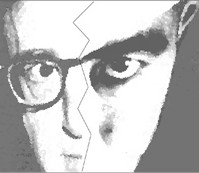
Husbands and Knives:
Twenty Shocking Parallels in the Lives of
Yukio Mishima and Woody Allen
1. Residents of Westernized islands. 2. Short male persons. 3. Directors shunned by Hollywood. 4. Existentialists. 5. Commited public "suicide." 6. Expressed nostalgic yearning. 7. Avidly absorbed the culture of the East (or the Upper East Side). 8. Withstood vulgar curiosity about biographical anecdotes. 9. Obsessed with social disgrace.
10. Strong feelings about raw fish.
11. Involved with Asian women.
12. Interested in masks and disguises to express facets of their personality.
13. Fascinated by their own celebrity.
14. Recounted traumatic episodes from youth.
15. Attended tea ceremonies (or at least the Russian Tea Room).
16. Brandished phallic symbol representative of their art (sword/clarinet).
17. Forged in the smithy of their souls the uncreated conscience of their race.
18. Resisted fulfilling the role of son, husband, and father, yet desired to preserve ancestral tradition.
19. Wore costumes of period which they believed themselves to personify (Samurai robe/trenchcoat).
20. Died in their thoughts every morning.
|




 |
|
|
 |
 |

The strange language spoken by circus owner Papa Lazarou, from the British dark comedy series The League of Gentlemen, may technically be gibberish ("Autom, sprow. Cana, tik bana! Sandwol, but no sera smee?") But it was inspired by Parlari, the private language of traveling British circus folk.
Pioneering West African composer Julien Jacob sings in his own mysterious, imaginary language, allowing his listeners to interpret his songs in their own way.
More from AskMefi: I'm 6'8". People are always asking me how tall I am. Instead of telling the truth, what are some witty, non-confrontational responses I might use? "Depends on where you start measuring." Vesona
is a universal language proposed by Dr. Alesha Sivartha, in which the
first two or three letters of any word give the general meaning and the
added letters specialize these meanings. An elaborate circular diagram (copy and paste link in new window) shows how Vesona encapsulates all of human knowledge. Verdurian
is a language spoken by 55 million imaginary people. The fruitful
creativity of Mark Rosenfelder offers background on the history,
grammar, and literature of Verdurian, as well as a Language Kit for constructing your own artificial languages. How to say How many flowers are in Pia Zadora's vase? in Esperanto? From Prolific Lo-Fi recording artist Ken Clinger,
who records songs in both English & Esperanto. He juxtaposes
awkward practice sentences from foreign language tutorials, creating
absurd, surreal alternate realities.
Why English is a Silly Language.
"It's really a wonder that any one manages to successfully speak
English at all. That people learn it all over the world is just
incredible... I mean amazing."
Tlön, Uqbar, Orbis Tertius. Jorge Luis Borges dreamed of a language called Ursprache
with absolutely no nouns. For example, there's no word for "moon," but
there's a verb meaning "to moon" or "to moonate." The sentence "The
moon rose above the water" in Ursprache would translate as "Upward
behind the onstreaming it mooned." The hypothetical lost continent of Mu (also known as Lemuria)
is said to have been destroyed in a global upheaval tens of thousands
of years ago. Unorthodox researcher Col. James Churchward believed he
rediscovered Mu's alphabet, comprised of beautiful and intricate glyphs. This is a post that I am “co-blogging” with Hanan Levin of Grow-a-Brain. Thank you, Hanan, for the links you suggested!
|

 |
"Is that a fact?" That is not a fact, but is either a pronoun or an adjective.
|


 |
Beautiful Woman“I was thinking that a beautiful woman could provide a, uh, diversion.”
“Here we go again. Cherchez la femme. The oldest trick in the book.”
—Clive Cussler, Polar Shift (2005)
Baited by a broad—the oldest trick in the book.
—F. Paul Wilson, “The Lord’s Work,” The Mammoth Book of Dracula (1997)
|


 |
Last night I fried an egg for dinner, and I dreamed about it that
night. In the dream, I intended to send my brother a picture of
that egg with the caption "This is not god, nor the priesthood. I
will send you articles on it."
 |
| If you have a strange dream to share, send it along! |
|

 |
|
|
 |
 |
Ben Macintyre of The Times
is against the bid to flush semicolons out of our prose — what he calls
"semi-colonic irrigation." He makes the following lovely point:
The beauty of the semi-colon lies in
its very vagueness. It indicates both connection and division. It is a
gentle way of connecting thoughts, without applying the abrupt brake of
a full stop or the breathiness of a comma. It implies a qualification
or refinement of the idea stated in the first part of the sentence.
Sometimes a string of semi-colons shows an evolving idea or
description, a string of interconnected ideas.
Virginia Woolf opens Mrs Dalloway with a lovely spray of semi-colons:
“How fresh, how calm, stiller than this of course, the air was in the
early morning; like the flap of a wave; the kiss of a wave; chill and
sharp and yet (for a girl of 18 as she was then) solemn, feeling as she
did, standing there at the open window, that something awful was about
to happen; looking at the tress with smoke winding off them and the
rooks rising, falling; standing and looking . . . ” |


 |
|
|
 |
 |

Staring At the Sun
I shake
And stare the sun
Till my eyes burn
— David Bowie, "The Voyeur of Utter Destruction"
Light is sweet, and it is pleasant for the eyes to behold the sun. — Ecclesiastes
The dawn ventures to confont the sky decorated with multiple colors ...
My eyes have an entirely different brilliance. I am afraid they
will make holes in the sky. —Nietzsche
The biggest drawback to mirrorshades is that they simulate a state of
permanent solar eclipse, a twilight world in which colors are distorted
and shadows are deeper. The sun has been both feared and revered
throughout human history, but only a handful of people have actually
had the courage to look it in the face. Granted, the naked eye
will sustain impairment if exposed to direct sunlight for too
long. Therefore, cyberpunk author Paul Di Filippo recommends
optical implants as a solution. “By stepping down the ratio of
photons to electrons,” he suggests, “you can do such things as stare
directly at the sun or at a welder’s flame without damage.”
But why stare into the sun in the first place? Because it's
dangerous. Because it's deviant. Because so few are man
enough to try it. Because radiation is natural. Because it
looked at you first. Perhaps the best reason of all is that the
sun frees us from the simplistic dogma of dualism. Photons of
light have no antiparticle. That means that in the world of light
there is no division between body and soul, good and evil, seer and
scenery, past and future, man and fellow man. In the world of
light, 1 + 1 = 1.
Photographs of the sun are typically taken through telescopes.
Such photographs are pale substitutes for actually looking at the
sun. As naturalist Annie Dillard notes in an essay about
witnessing a total eclipse, "The lenses of telescopes and cameras can
no more cover the breadth and scale of the visual array than language
can cover the breadth and simultaneity of internal experience.
Lenses enlarge the sight, omit its context, and make of it a pretty and
sensible picture, like something on a Christmas card." Scientific
instruments, then, limit our perception even as they extend the range
of our vision. No matter what apparatus we use to view the sun,
at some point we will encounter a "blind spot." Clearly, the
naked eye (capable of detecting a single photon of light) or naked
implant is the only way to go.
There are two steps to proper sun-staring. First, stare at the
sun with the eyes open. This is not an easy thing to do.
Rochefoucauld, the Benjamin Franklin of France, once said that "Neither
the sun nor death can be looked at with a steady eye." He was
correct. In his novel Staring at the Sun, Julian Barnes warns
that "You can't stare at the sun for too long--not even the setting,
quiet sun. You would have to put your fingers in front of your
face to do that." So don't have any preconceptions that it's
going to be simple or pleasant. Try not to blink. Try not
to look away. Shield your eyes with your fingers at first if you
must, but then slowly spread your fingers to reveal the awesome light
of the sun. If you must look away then do so, but slowly bring
your eyes back to the sun. If you find yourself involuntarily
blinking rapidly, hold your eyelids open with your fingers.
Second, stare at the sun with the eyes closed. The sun's
afterimage will remain under your eyelids, indelibly etched into your
cornea. James Patrick Kelley describes this phenomenon in his
cyberpunk story "Solstice": "Cage shut his eyes and still he
could see it: blood red, flashing blue, veins pulsing across its
surface."
What is the significance of this afterimage? No doubt each person
must find his omn answer to this question. In her novel Century 21,
Ewa Kuryluk attempts a philosophical answer. She says that "We
must preserve the sun's afterimage under our lids" because it forces us
to confront "ideals, abstract beings which are neither bodies nor
forces dwelling in bodies." Perhaps she means that we can harness
the sun's forces, snatch them from the physical body of the star, and
carry them with us--literally within our eyelids. In any case,
Kuryluk seems to be touching upon a deeper truth about the perception
of reality.
The French poet Paul Claudel agrees with Kuryluk that we can carry the
body of a star within our eyelids, making us the center of our own
private solar system. "We can see in the eye a sort of scaled
down, portable sun," he says, "and therefore, a prototype of the
ability to establish a radius from it to any point on the
circumference." The German poet Yvan Goll describes such a
private solar system:
The universe revolves around you
Eye with
facets which chase away the eyes of the stars
And implies them in
your gyratory system
Carrying away nebulas of eyes in your madness.
The Maja-Ratri, a Sanskrit
text, says that light is the source of all thought, since light is a
combustion of star evolution. That star evolution exists in the
inner dimensions of your mind as a phosphene explosion.
Psychologist Carl Jung once wrote that "when our senses react to real
phenomena, sights, and sounds, they are somehow translated from the
realm of reality into that of the mind. Within the mind they
become psychic events, whose ultimate nature is unknowable."
If you're eventually going to have your eyes replaced anyway, why not
burn them out in a single blaze of glory? Besides, the
combination of sunglasses and a walking stick is a timeless fashion
statement.
|

 |
|
|
 |
 |
From The Which Punctuation Mark Are You Test:
"Congratulations! You are the semicolon! You are the highest expression
of punctuation; no one has more of a right to be proud. In the hands of
a master, you will purr, sneering at commas, dismissing periods as
beneath your contempt. You separate and connect at the same time, and
no one does it better. The novice will find you difficult to come to
terms with, but you need no one. You are secure in your elegance,
knowing that you, and only you, have the power to mark the skill or
incompetence of the craftsman. You have no natural enemies; all fear
you. And never, NEVER let anyone tell you that you cannot appear in
dialogue!" |

 |
Baiting a Hook“Trick” is dlllos in Homeric Greek, and the oldest known use of the term refers to a quite specific trick: baiting a good to catch a fish. East and west, north and south, this is the oldest trick in the book. No trickster has ever been credited with inventing a potato peeler, a gas meter, a catechism, or a tuning fork, but trickster invents the fish trap.
—Lewis Hyde, Trickster Makes This World (1998)
|

 |
|
|
 |
 |
Speaking of semicolons, I stumbled upon the most marvelous poem by Matt
"World's Best Writer Ever" Getty, entitled "Inside the Semicolon
(Draft)." Here's the first stanza:
The sinister semicolon lurks
on the inside. Always inviting,
he calls you to follow as he opens
doors that look like walls.
To read more (you'll be glad you did), see the poetry section of Matt's website. |

 |
|
|
 |
 |
This is a puzzle in which you try to
transform one mythological creature into another. Drag tiles from
the bottom left into the grid on the right, forming the proper head,
body, and wings of each creature listed. Each line of the grid
will feature only one change from the row immediately above. When
the grid is complete, click the large arrow to test your matrix.
The first person to send a screen shot of the winning matrix will receive a free set of One-Letter Words Knowledge Cards! Send it to solution @ pobox.com.
Click the image below to launch the game ( Shockwave plug-in required). The file size is 1.2 MB.

|


 |
|
|
 |
 |
After six years of determined searching, Lars Rasmussen, a purveyor of fine used books, collected a complete alphabet of books with one letter for titles (including Scandinavian letters). He was inspired by this quotation from James Joyce's Ulysses:
Have you read his F?
O yes, but I prefer Q.
Yes, but W is wonderful.
O yes, W. |

 |
| I Found a Penny Today, So Here's a Thought |
(permalink) |
 |
 |
 |
|

 |
|
|
 |
 |
Here's a strange dream:
I dreamed I was among a group of people being tortured very
viciously. Our assailants were cutting off hands and feet, using
sharp metal rods for impaling, and so on. I noticed that one of
my fellow victims, a woman, had a tiny round bandage on her
forehead. I recognized this as evidence that she had been impaled
through the head, and I deeply dreaded such a fate for myself.
(In retrospect, I associate this small circle with the Hindu "bindi"
representing the Third Eye, but in the dream this didn't occur to
me.) At some point during my torture, I gained
enlightenment. I felt the music of the universe enter my body
through my root chakra, and I felt myself "puffing up" like a balloon
being filled, especially in my belly. I floated in bliss for a
while. When my awareness focused back on the physical plane, I
saw two Hindus holding up their hands in prayer and bowing to me
reverently, acknowledging my holiness. I returned the
honor. One of them opened a book to show me which deity was my
overseer or lord in the greater hierarchy of things. I don't
remember the god's name, but I remember reading these words: "This god
is associated with endings and beginnings." I scoffed slightly,
thinking that the description was too generic. "That's what
they're ALL associated with," I thought to myself. (In
retrospect, I realize that my overseer is Agni, the Hindu two-headed
god of fire who rules over the digestive fires in the belly.) I
only vaguely recall subsequent scenes of my dream in which I was
operating as an enlightened being and interacting with my
followers. I certainly felt happy bestowing benevolence.
 |
| If you have a strange dream to share, send it along! |
|

 |
Bait and SwitchHe had fallen for the oldest trick in the book, the one con-men called bait-and-switch: if you tell a lie and get caught, back up and tell half the truth.
—Stephen King, Needful Things (1991)
|

 |
SONG: Operator (That's Not the Way It Feels)
ARTIST: Jim Croce
ORIGINAL LYRIC:
Thank you for your time
Oh, you've been so much more than kind
And you can keep the dime
ADJUSTED FOR INFLATION AND CULTURAL TRENDS by Jonathan Caws-Elwitt:
Thanks for listening hard
On a cell phone in your yard
There goes my calling card
 |
| * Payphones used to take dimes, but now they take quarters. Isn't
it time to update song lyrics to reflect the realities of
inflation? Alas, it's vastly easier to rhyme the word "dime" than
the word "quarter," but here at Inflationary Lyrics Headquarters we
have risen to the challenge. Please join the fun and share your
own inflationary lyrics, with both the "before" and "after" versions! |
|

 |
|
|
 |
 |
What makes a great story? Marketing expert Seth Godin
suggests that "The best stories don't teach people anything new.
Instead, the best stories agree with what the audience already believes
and makes the members of the audience feel smart and secure when
reminded how right they were in the first place." (Thanks, Gordon!) |

 |
|
|
 |
 |
In English:
Two people were sitting by a fence. The first says:
"Tell me, if I'm looking at you, and thinking of something, and you
know that I'm thinking of that thing, and you're thinking of the same
thing, isn't it just as if we had said it?"
"Well, yes..."
"Then, which of us is it like he had said it?"
Translated into Zoinx:
ona be brazer ves unta`i, dalto`i. sila ro'st i tan:
= silali ga fen go, en nebasi go he`i ga, san fermisi go man xiruli,
san esasi ga mse`i fermisi go man set, san fermisi ga man tira, i`aneka
set vor mse`i silata gi`o'st? =
= sen dot... =
= san, eni`oka set ane`i fen gi`o, mse`i i`a'st vor mse`i silata ge`i set? =
The Zoinx
language (invented in 1993), does not have a fictional population of
speakers or a corresponding history, yet "quite a bit of cultural
information can be gathered from the language itself."
|

Page 0 of 4032


Original Content Copyright © 2026 by Craig Conley. All rights reserved.
|




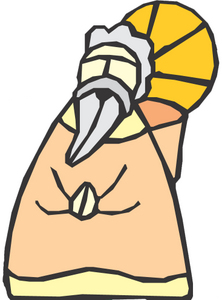
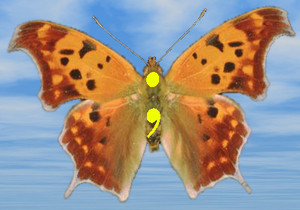



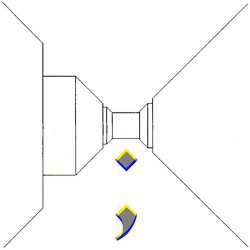

 = Tiger Woods is awesome, and other helpful phrases from the
= Tiger Woods is awesome, and other helpful phrases from the 
